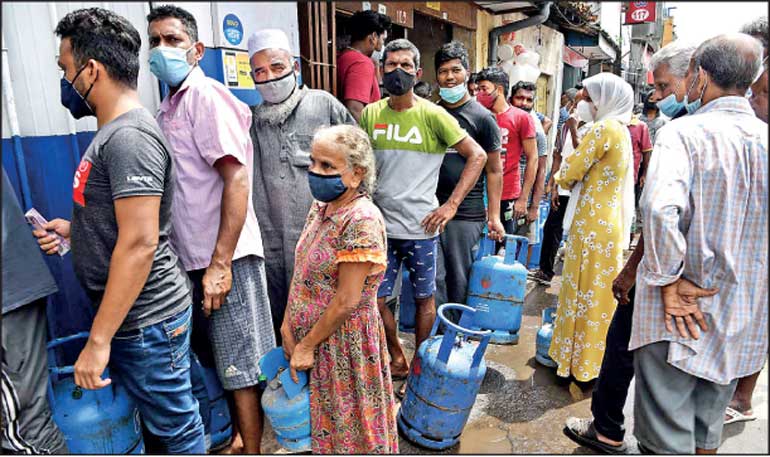Saturday Feb 21, 2026
Saturday Feb 21, 2026
Saturday, 6 November 2021 00:00 - - {{hitsCtrl.values.hits}}

People lined up for LP gas yesterday amid severe shortages islandwide – Pic by Shehan Gunasekara
By Charumini de Silva
Amidst the lack of foreign exchange, food industries fear a looming crisis playing out across the economy due to supply and demand imbalances.
The latest stumbling block has arisen with the curtailment of 25% of supplies to food manufacturers, forcing them to discontinue certain production lines, lay off employees and slash salaries.
“The shortage of supply has now led to a perfect storm for a continued food crisis,” industry stakeholders claimed.
With prices of staples trending upwards, Sri Lanka is grappling with an economic crisis amidst rising inflation, as depleted foreign exchange reserves hit imports.
“We are in a crisis now with our supply being curtailed. This has forced companies to discontinue certain production lines, cut overtime payments and possible employment layoffs to survive in the industry,” confectionery industry stakeholders told the Daily FT.
Ahead of the festive season, they said shortages of key ingredients would severely impact profitability of their businesses.
They said broad inflation had led many manufacturers to rely on price increases to help offset some of the higher expenses, but now overall commodity prices had skyrocketed by 45% in the last six months amidst soaring logistics and packaging costs.
“If there is no solution, we will not be in a position to continue business, but close down factories endangering thousands of jobs,” they charged.
In a related development, bakery industry stakeholders said with the Government failing to ensure buffer stocks of the staple food — rice — they see a shift in consumer patterns towards cheaper alternatives such as bread. However, given the current shortage of key ingredients, bakeries are unable to meet increasing demand.
“The depletion of foreign exchange is the main reason for the crisis we are in today. Successive governments have failed to implement policy reforms that Sri Lanka desperately needs to keep such economic crises at bay. The results of adverse policy decisions ultimately have to be borne by the citizens. We see no end to these problems,” they claimed.
When asked if there would be a possible price hike in the near future, the stakeholders of both industries said they were not sure if the products could be sold at that price given the high cost of living.
“History shows us that price adjustments are more likely to be accepted in the market when industry-wide and broad-based input cost inflation occurs. But that is not the environment we are in today. Even if we pass along the higher costs of raw materials, labour, energy and freight to end consumers, who will have the purchasing power to buy at that price?” they asked.
It was also pointed out that certain confectionery export firms were faced with raw material supply constraints due to Chinese factories now working only 15 days, whilst to boycott China, Western economies were opting to source from other countries, adding pressure on those source markets.
“Export companies are in dire straits to meet the orders with supply constraints. Firms engaged in the confectionery industry have maintained our export markets despite many challenges internally and externally. If we lose them, the impact to our economy will be colossal,” they pointed out.
Industry stakeholders said they had no hope in relation to the upcoming Budget 2022, but feared extra burdens and more curtailment.
Disgruntled consumers however claimed that the Government was only concerned about traders and importers, claiming that half of the parliamentarians were key businessmen.
